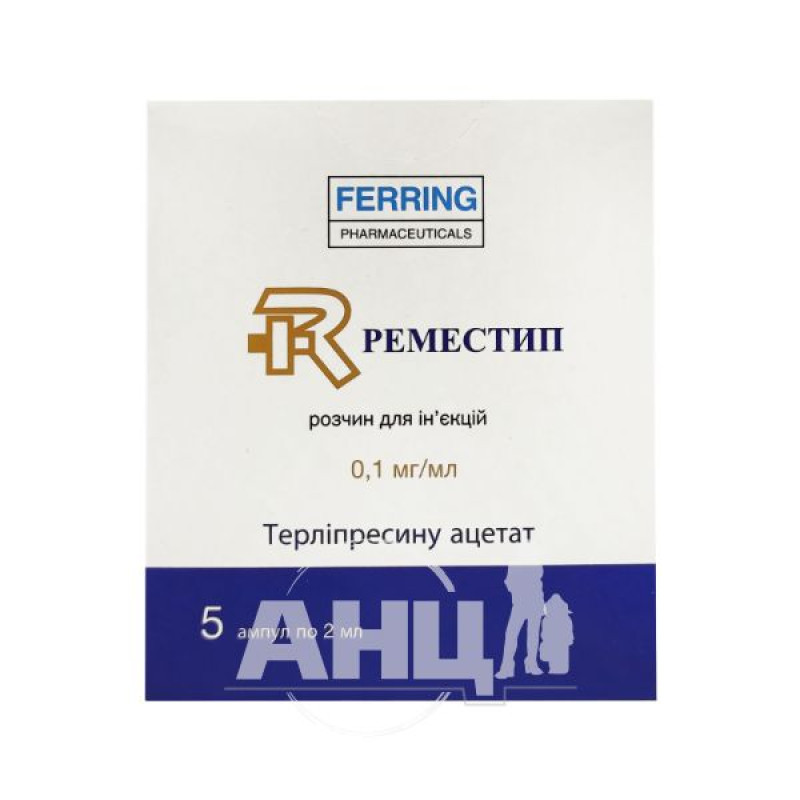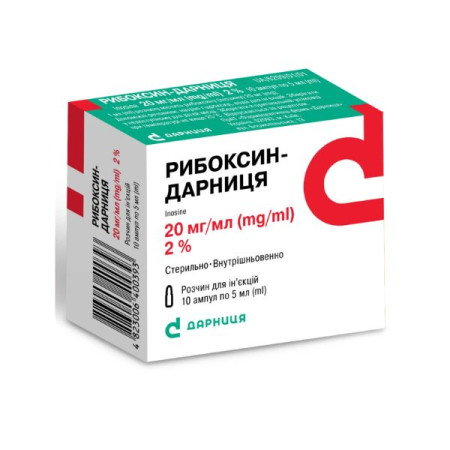Remestim solution for injection 0.1 mg/ml ampoule 2 ml No. 5

Pharmacological properties
Pharmacodynamics. Terlipressin (n-triglycyl-8-lysine-vasopressin) is a synthetic analogue of the posterior pituitary hormone vasopressin, which is formed by replacing arginine (an amino acid in the 8th position) with lysine and attaching 3 glycine residues to the terminal cysteine group. Terlipressin metabolites have pharmacological activity, which have a pronounced vasoconstrictor and hemostatic effect. The most noticeable effect is a decrease in blood circulation in the parenchyma of internal organs, as a result of which hepatic blood flow and pressure in the portal vein system decrease.
In a pharmacodynamic study, it was found that terlipressin, like similar peptides, causes spasm of arterioles and venules mainly in the parenchyma of internal organs, contraction of smooth muscles of the esophageal wall, and increased tone and intestinal peristalsis.
In addition to affecting vascular smooth muscle, Remestip stimulates the smooth muscle of both the pregnant and non-pregnant uterus.
According to the results of studies of the action of the drug Remestipin in animals and humans, its maximum activity was noted in internal organs and skin.
No clinical manifestations of the antidiuretic effect of terlipressin were detected.
Pharmacokinetics. Terlipressin itself is inactive against smooth muscle, but it is a chemical depot for pharmacologically active substances formed as a result of enzymatic cleavage. This effect develops more slowly than that of lysine vasopressin, but lasts much longer.
Lysine-vasopressin is metabolized in the liver, kidneys, and other organs and tissues.
The pharmacokinetic profile after IV administration is biphasic. T½ is 40 min, metabolic clearance is 9 ml/kg/min, volume of distribution is 0.5 l/kg body weight. The expected concentration of lysine vasopressin begins to be achieved in the blood plasma approximately 30 min after terlipressin administration. C max is reached after 60-120 min.
Indication
Bleeding from the digestive tract and genitourinary tract, for example, bleeding from varicose veins of the esophagus, gastric and duodenal ulcers; uterine bleeding due to functional disorders or other causes, childbirth, abortion, etc., bleeding associated with surgical interventions, in particular on the organs of the abdominal cavity and pelvis.
Locally - during gynecological interventions on the cervix.
Application
adults
Initially, an intravenous injection of 2 mg terlipressin is given every 4 hours. Treatment should be continued for 24 hours after the bleeding has stopped, but not more than 48 hours. After the initial dose is used, it can be adjusted to 1 mg every 4 hours for patients weighing 50 kg or in case of adverse reactions.
Bleeding from esophageal varices in adults: 1 mg (1000 mcg) every 4-6 hours for 3-5 days. To prevent recurrence of bleeding, treatment should be continued for 24-48 hours after its cessation. The drug is administered intravenously as a bolus or as a short-term infusion through a dropper. The drug is used undiluted or diluted with 0.9% sodium chloride solution.
Other types of gastrointestinal bleeding in adults: 1 mg (1000 mcg) every 4-6 hours. The drug can also be used as a first aid tool, regardless of surgical intervention, in cases of suspected upper gastrointestinal bleeding.
Internal bleeding in children: usually administered at a dose of 8 to 20 mcg/kg body weight at intervals of 4-8 hours. The drug should be administered throughout the entire period of bleeding, the general recommendation is to continue administration to prevent recurrence of bleeding in the same way as in the case of bleeding in adults. In the presence of sclerosed esophageal varices, a single administration of 20 mcg/kg body weight is prescribed as a bolus.
Genitourinary tract bleeding: given the difference in endopeptidase activity in blood plasma and tissues, the dosage range is quite wide - from 0.2 to 1 mg, which is prescribed at intervals of 4-6 hours.
In juvenile uterine bleeding, the recommended doses are from 5 to 20 mcg/kg body weight. The drug should be administered intravenously.
Local use in gynecological interventions on the cervix: 0.4 mg (400 mcg) is diluted with 0.9% sodium chloride solution to a volume of 10 ml, applied intra- or paracervically. In this case, the effect of the drug develops after 5-10 minutes. If necessary, the dose can be increased or re-administered.
Contraindication
Hypersensitivity to the active substance or auxiliary components of the drug. Septic shock in patients with low cardiac output. Pregnancy.
Side effects
Adverse reactions most often observed during clinical studies (frequency - 1-10%): pallor of the skin, increased fever, abdominal pain, nausea, diarrhea and headache.
The antidiuretic effect of Remestip may lead to hyponatremia if fluid balance is not controlled.
The frequency of side effects is classified as follows: very common (≥1/10); common (≥1/100-1/10); uncommon (≥1/1000-1/100); rare (≥1/10,000-1/1000), very rare (1/10,000), unknown (available data do not allow to estimate the frequency).
Vascular disorders: often - peripheral vasoconstriction, peripheral ischemia, pallor of the skin, hypertension or hypotension; infrequently - intestinal ischemia, peripheral cyanosis, hot flashes.
Respiratory system disorders: infrequently - difficulty breathing, respiratory failure, pain during breathing, bronchospasm, respiratory arrest; rarely - shortness of breath.
Gastrointestinal disorders: often - transient diarrhea, transient spastic abdominal pain; infrequently - transient nausea, transient vomiting.
Nervous system disorders: often - headache; infrequently - epileptic seizures; very rarely - apoplexy.
Metabolic disorders: infrequently - hyponatremia, if fluid balance is not controlled.
Skin and subcutaneous tissue disorders: uncommon - local skin necrosis, lymphangiitis.
Genital disorders: often - spastic pain in the lower abdomen (in women); infrequently - increased uterine tone, uterine ischemia.
Injection site disorders: uncommon - injection site necrosis.
Isolated cases of hypersensitivity reactions have been reported.
Special instructions
When treating with Remestip, it is necessary to monitor blood pressure, heart rate and fluid balance. The drug should be used with caution in patients with AG and heart disease. Special caution should be exercised in the treatment of the elderly, as experience in this category of patients is limited. There are no data on dosage recommendations for this category of patients.
Remestip should not be used in patients with septic shock with low cardiac output.
Remestip is not a blood substitute for patients with BCC deficiency.
Since focal necrosis has been observed sporadically after terlipressin administration, intramuscular administration should be avoided, using undiluted drug at a dose of ≥0.5 mg intravenously only.
Pregnancy and breast-feeding. The use of Remestip during pregnancy is contraindicated. Remestip has been shown to cause uterine contractions and increased intrauterine pressure in early pregnancy and may reduce uterine blood flow. Spontaneous abortions and malformations have been observed in rabbits.
It is not known whether the drug is excreted in breast milk. The penetration of Remestipin into breast milk has not been studied in animals. A risk to the nursing infant cannot be excluded. A decision on whether to continue/discontinue breast-feeding or to continue/discontinue therapy with Remestipin should be made taking into account the benefit of breast-feeding to the child and the benefit of terlipressin therapy to the woman.
Children. The drug is used to treat children according to the recommended regimen.
Ability to influence the reaction rate when driving vehicles or operating machinery. No studies have been conducted on the effect of terlipressin on the ability to drive vehicles and operate machinery.
Interactions
Terlipressin enhances the effect of non-selective α-adrenergic blockers in reducing portal hypertension.
Concomitant use with drugs that cause bradycardia (such as propofol, sufentanil) may lead to severe bradycardia and decreased cardiac output.
Overdose
The recommended dose (2 mg over 4 hours) should not be exceeded because the risk of developing severe cardiovascular side effects is dose-dependent.
Clonidine or sympatholytics should be used to control hypertension that may develop during treatment with Remestip.
Atropine is administered to stop bradycardia.
Storage conditions
At a temperature of 2-8 °C (in a refrigerator). Do not freeze! The drug can be stored at a temperature of 25 °C (for example, in an ambulance) for 1 month.
There are no reviews for this product.
There are no reviews for this product, be the first to leave your review.
No questions about this product, be the first and ask your question.




